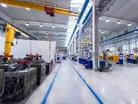Business growth in manufacturing has globally risen by 3.7%

According to a new report released by Epicor Software Corporation, global manufacturing business has grown by 3.7%.
The industry has reached 103.7 through index points, up from last year’s base figure of 100 points.
The Global Growth Index has assessed manufacturing performance across 14 different territories, finding that turnover is driving the growth.
Manufacturers have recorded strong sales and turnovers over the past year, with a 5% rise reaching 70% overall.
Profits and product ranges have seen a similar pattern across the industry – the sectors have both grown by 3%, with product range growth reaching 64% and profit growth hitting 67%.
SEE ALSO:
-
China’s manufacturing sector hits four month high, boosting stocks
-
UK manufacturing industry slows after best quarter in three and a half years
Exports and overseas sale growth has expanded by 2%, from 49% in 2017 to 51% in 2018, matching the same figures as geographic coverage growth.
Worforce growth, however, remained the same during the review period at 48% both years.
“Although we have seen impressive overall rates of growth this year, there’s an underlying consensus among the businesses we surveyed, that growth hasn’t been easy to achieve,” stated Scott Hays, Senior Vice President of Product Marketing at Epicor.
“Nevertheless, businesses in the manufacturing sector have also affirmed that investing in the right technology will help position themselves for growth in the future.”
“With automated systems reaching production lines around the world, cloud adoption continuing to rise, and enterprise resourcing planning (ERP) solutions transforming the way businesses manage workflows and share their data, this is a sentiment that we will track year-on-year.”

